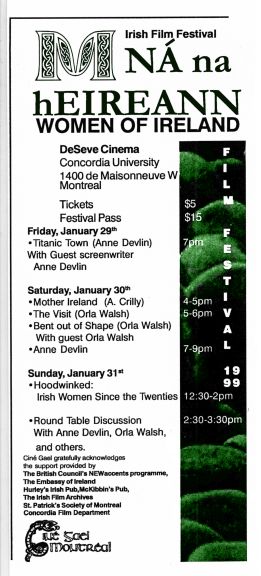Ciné Gael Montréal Irish Film Series 1999
Our 1999 Season actually opened in December 1998 with Dancing at Lugnasa. 1999 proper got underway with
Mna na hEireann - Woman of Ireland Film Festival, a weekend of films and discussion,
with special guests Orla Walsh and Anne Devlin, and an array of their films.
We co-hosted the Premiere of The General at the Cinema Loews.
We also screened the premiere of This is my Father with a stellar cast which included Jacob Tierney.
Our Members' Appreciation Evening featured the screening of Brendan Byrne's documentary on Gerry Conlon.
A memorable season with guest speakers who gave all of us an enriched enjoyment of the screenings.
The capper for our season came in August when the World Film Festival [WFA] staged A Celebration of Irish Film
with Pat O'Connor and Stephen Rea on the Festival Jury.
 ` Meryl Streep has made many a grand acting gesture in her career, but the way she simply peers out a window in
Dancing at Lughnasa ranks with the best. Everything the viewer need know about Kate Mundy,
the woman she plays here, is written on that prim, lonely face and its flabbergasted gaze.
` Meryl Streep has made many a grand acting gesture in her career, but the way she simply peers out a window in
Dancing at Lughnasa ranks with the best. Everything the viewer need know about Kate Mundy,
the woman she plays here, is written on that prim, lonely face and its flabbergasted gaze.
Among the five unmarried sisters who are the subject of Brian Friel's play (and who are named for his own mother and aunts), it is Kate who wears her unmarried status least comfortably. And it is Kate who radiates the most wistful, turbulent emotions while watching younger, prettier Christina (Catherine McCormack) dance with a lover.
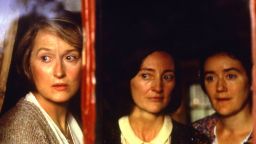 "Her whole face alters when she's happy," Kate whispers about Christina in astonishment, speaking almost to herself.
It is as if this furiously upright schoolteacher, the sister who has taken it upon herself to champion rectitude
in the small Irish village where Mr. Friel's play unfolds, had discovered the sweetness of Christina's flirtatious exuberance
and the chill of her own loneliness as if for the very first time.
"Her whole face alters when she's happy," Kate whispers about Christina in astonishment, speaking almost to herself.
It is as if this furiously upright schoolteacher, the sister who has taken it upon herself to champion rectitude
in the small Irish village where Mr. Friel's play unfolds, had discovered the sweetness of Christina's flirtatious exuberance
and the chill of her own loneliness as if for the very first time.
Set in Donegal in 1936 and made poignant by the hindsight of narration, Dancing at Lughnasa preserves the author's memories of a world about to change irrevocably, filled with hints of foreboding that made it so powerful an experience on stage. On film, as directed handsomely by Pat O'Connor, it makes for a soaringly scenic film, yet a slightly more diffuse, less haunted drama.
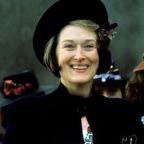 The play, an actors' heyday, is rich with memories of the sisters and their camaraderie, especially when their fragile fellowship
is shaken by the arrivals of two men. While the film begins with a rich evocation of the sisters' rustic chores and rituals
in the beautiful, isolated setting they call home, it's clear that these men can change everything. One is Father Jack
(Michael Gambon), once the family's bright-eyed brother and now a broken old man, returning from missionary work in Africa
and filled with visions of a world his sisters have never seen.
The play, an actors' heyday, is rich with memories of the sisters and their camaraderie, especially when their fragile fellowship
is shaken by the arrivals of two men. While the film begins with a rich evocation of the sisters' rustic chores and rituals
in the beautiful, isolated setting they call home, it's clear that these men can change everything. One is Father Jack
(Michael Gambon), once the family's bright-eyed brother and now a broken old man, returning from missionary work in Africa
and filled with visions of a world his sisters have never seen.
While Mr. Gambon's gently eccentric Jack presides over the story with a mysterious intensity, the other male visitor is more mundane. Gerry Evans (Rhys Ifans) is Christina's handsome, conventionally romantic beau (and the father of Michael, the young man who nostalgically narrates the story). The arrival of Gerry prompts the film into the very sorts of picturesque rhapsodies that give this opened-up drama its postcard appeal while removing the seriousness and sting from events that transpire. - New York Times [Janet Maslin]
with Julie Walters, Ciarán Hinds.
:: Guest Speaker: screenwriter Anne Devlin
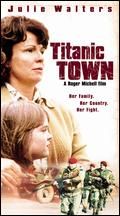 Titanic Town is a 1998 film. Ciarán Hinds and Julie Walters play Aidan and Bernie McPhelimy, a mother and father
caught in the Northern Ireland Troubles in Belfast (known for building the Titanic, hence the title).
Bernie's close friend is killed in the crossfire and so she becomes involved in the peace process.
Titanic Town is a 1998 film. Ciarán Hinds and Julie Walters play Aidan and Bernie McPhelimy, a mother and father
caught in the Northern Ireland Troubles in Belfast (known for building the Titanic, hence the title).
Bernie's close friend is killed in the crossfire and so she becomes involved in the peace process.with Magael Mclaughlin
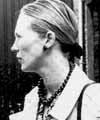 A powerful drama about a prisoner’s wife in Belfast in 1987. On the way to visit her husband in prison, a Northern Irish woman
remembered the events from her seven years of being a republican prisoner’s wife, and the ways in which she has fought
against the expectations that the role has forced upon her.
A powerful drama about a prisoner’s wife in Belfast in 1987. On the way to visit her husband in prison, a Northern Irish woman
remembered the events from her seven years of being a republican prisoner’s wife, and the ways in which she has fought
against the expectations that the role has forced upon her.Read a preview on Jstor of Megan Sullivan's review of the film here.
Arts Council Film Award, 1992
Cultural Traditions Group Media Prize, 1992
Best Film (Educational Politics), Oberhausen Film Festival, 1993
Best Actress, Brest Film Festival, 1993
Best Film and Best Actress, Huy, Belgium, 1993
Certificate of Merit, Cork Festival 1993
with Stuart Dannell Foran, Des O’Byrne
:: Guest Speakers: Orla Walsh and Anne Devlin
 Danny, a gay punk, makes friends with a young bullied boy Stephen but their friendship has consequences...
Danny, a gay punk, makes friends with a young bullied boy Stephen but their friendship has consequences...Best Irish Short Film, Cork Film Festival
Best Film, Hamburg Gay and Lesbian Festival
Audience Award, Galway Film Fleadh
with Anne Devlin, Orla Walsh, and others
Hurley's Irish Pub - 1225 Crescent 6-8pm
Screening of Brendan Byrne's documentary on Gerry Conlon.
"One of the most affecting documentaries made in this country in recent years."
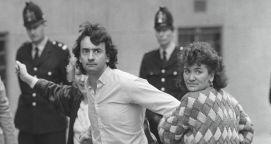 Byrne extended his documentary approach to the study of one man's personal struggle with sanity
in How Far Home, about Gerry Conlon, convicted of the 1974 Guildford Pub Bombings,
but proved innocent and released after twenty years of imprisonment. In this film the freed and exonerated Conlon
was the subject of a sustained psychological examination, which revealed an exhausted man ill equipped to deal
with everyday life having been first a prisoner, then a symbol of injustice and political beliefs he felt he did not hold.
Byrne extended his documentary approach to the study of one man's personal struggle with sanity
in How Far Home, about Gerry Conlon, convicted of the 1974 Guildford Pub Bombings,
but proved innocent and released after twenty years of imprisonment. In this film the freed and exonerated Conlon
was the subject of a sustained psychological examination, which revealed an exhausted man ill equipped to deal
with everyday life having been first a prisoner, then a symbol of injustice and political beliefs he felt he did not hold.
He described In the Name of the Father as a millstone around his neck, and Byrne neatly managed to suggest that the human cost of recent history has not been measured enough in terms of its effects on the living.
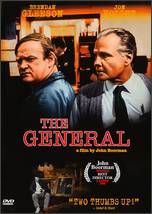 The General is an Irish crime film directed by John Boorman about Dublin crime boss
Martin Cahill (more on Wiki
The General is an Irish crime film directed by John Boorman about Dublin crime boss
Martin Cahill (more on Wiki  ),
who pulled off several daring heists in the early 1980s, and attracted the attention of the Garda Síochána,
IRA, and Ulster Volunteer Force. The film was shot in 1997 and released in 1998. Brendan Gleeson plays Cahill,
Adrian Dunbar plays his friend Noel Curley, and Jon Voight plays Inspector Ned Kenny.
),
who pulled off several daring heists in the early 1980s, and attracted the attention of the Garda Síochána,
IRA, and Ulster Volunteer Force. The film was shot in 1997 and released in 1998. Brendan Gleeson plays Cahill,
Adrian Dunbar plays his friend Noel Curley, and Jon Voight plays Inspector Ned Kenny.
Among the five unmarried sisters who are the subject of Brian Friel's play (and who are named for his own mother and aunts), it is Kate who wears her unmarried status least comfortably. And it is Kate who radiates the most wistful, turbulent emotions while watching younger, prettier Christina (Catherine McCormack) dance with a lover.
 After selling stolen paintings to the UVF, Cahill realizes he has made a dangerous mistake. When the PIRA hear of this,
they order his assassination, which is carried out on 18 August 1994.
After selling stolen paintings to the UVF, Cahill realizes he has made a dangerous mistake. When the PIRA hear of this,
they order his assassination, which is carried out on 18 August 1994.
The film is based on the book of the same name by Irish journalist Paul Williams, who is crime editor of
Ireland's best-selling tabloid, The Sun.
 Director Boorman was himself one of Cahill's burglary victims. This event is dramatized in a scene
in which Cahill breaks into a home, stealing a gold record and pilfering a watch from the wrist of a sleeping woman.
The gold record, which Cahill later breaks in disgust after discovering it is not made of gold, was awarded
for the score of Deliverance, Boorman's best-known film.
Director Boorman was himself one of Cahill's burglary victims. This event is dramatized in a scene
in which Cahill breaks into a home, stealing a gold record and pilfering a watch from the wrist of a sleeping woman.
The gold record, which Cahill later breaks in disgust after discovering it is not made of gold, was awarded
for the score of Deliverance, Boorman's best-known film.
Filming was at various locations around Dublin, including South Lotts and Ranelagh.
The General was nominated for, and won, several awards, including Best Director
at the 1998 Cannes Film Festival and the Grand Prix of the Belgian Syndicate of Cinema Critics.
All the performances are impressive, but Gleeson and Voight are especially memorable, lending an almost tragic air
of inexorability to Cahill and Kenny's cat-and-mouse games.
- Time Out [Geoff Andrew]
 Set in Ireland in the 1950s, this is the story of nine year old Barry O'Neill, altar boy and innocent, who has a vision of the Blessed Virgin Mary
and the ensuing snowball of religious euphoria that threatens to turn him into a saint.
Set in Ireland in the 1950s, this is the story of nine year old Barry O'Neill, altar boy and innocent, who has a vision of the Blessed Virgin Mary
and the ensuing snowball of religious euphoria that threatens to turn him into a saint.
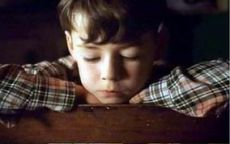 Father McAteer is ecstatic; Barry is reluctant to disabuse him while Barry's father is sceptical. Eglish gets its grotto and is soon vying
with the glories of Fatima and Lourdes as coach-loads of pilgrims flock to the village. But is Barry really a visionary
or just trying too hard to please?
Father McAteer is ecstatic; Barry is reluctant to disabuse him while Barry's father is sceptical. Eglish gets its grotto and is soon vying
with the glories of Fatima and Lourdes as coach-loads of pilgrims flock to the village. But is Barry really a visionary
or just trying too hard to please?
Shimmering with the memories of carefree summers long since gone, writer/director Barry Devlin's All Things Bright and Beautiful is an insightful, often amusing tale of innocent childhood.
Premier screening, opening in theatres June 23rd
119 mins Dir: Paul Quinn with Aidan Quinn, Moya Farrelly, James Caan, John Cusack, Colm Meaney, Jacob Tierney, and Stephen Rea
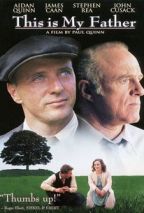 For director Paul Quinn, this is a fine effort, and represents the kind of motion picture that lovers of well-constructed romances long for.
- ReelViews.net [James Berardinelli]
For director Paul Quinn, this is a fine effort, and represents the kind of motion picture that lovers of well-constructed romances long for.
- ReelViews.net [James Berardinelli]
This Is My Father chronicles the journey of a disillusioned Chicago schoolteacher who returns to Ireland with his nephew in search of the man who was his father. Widowed and childless, the lonely Kieran Johnson is no longer able to relate to his students. His fragile mental state is mirrored by his family circumstances: his mother has had a stroke and is unable (or unwilling) to communicate and his divorced sister, Betty, is burdened with their mother's care while trying to raise her troubled teenage son Jack.
 The film portrays a tragic love story set in late 1930s Ireland, focusing on the relationship between
Fiona Flynn (Moya Farrelly), a beautiful, feisty seventeen-year-old from a middle-class family, and Kieran O'Dea (Aidan Quinn),
a shy labourer in his early thirties, and the search decades later by their son, Kieran Johnson, (James Caan) to find his roots in late 1990s Ireland.
The film portrays a tragic love story set in late 1930s Ireland, focusing on the relationship between
Fiona Flynn (Moya Farrelly), a beautiful, feisty seventeen-year-old from a middle-class family, and Kieran O'Dea (Aidan Quinn),
a shy labourer in his early thirties, and the search decades later by their son, Kieran Johnson, (James Caan) to find his roots in late 1990s Ireland.
The film is told as an interweaving of the nineties setting, where Kieran is hearing the story of his parents, and the events of the 1930s. Kieran Johnson grew into adulthood unaware of his parents' story or of the tragic events that caused his mother to leave Ireland on her own while pregnant.









